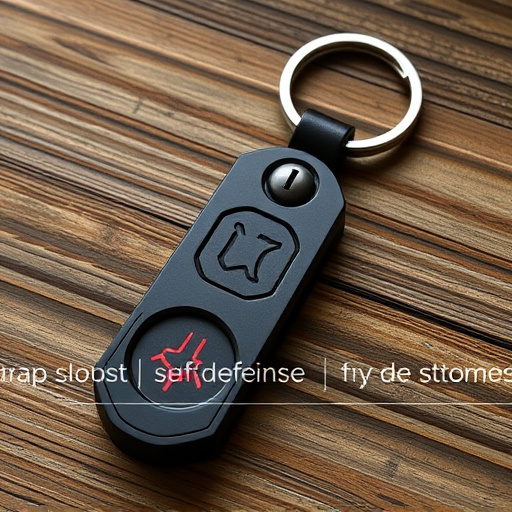Understanding the legal definition of a "tactical keychain weapon" is crucial when considering its use for self-defense in the U.S., where state laws vary significantly. While titanium tactical keychains offer durability and concealed defense, users must research their state's regulations regarding blade length, overall dimensions, and licensing requirements to ensure legal compliance and avoid potential consequences. Responsible handling includes staying within legal boundaries, discreet carriage, and practicing common sense in public spaces.
“Uncover the power of self-defense in your pocket with a titanium tactical keychain. In a world where personal safety is paramount, understanding the legal requirements surrounding these handy tools is essential. This comprehensive guide explores ‘Titanium Tactical Keychain Weapons Legal’ by delving into state-by-state regulations, defining what constitutes a weapon, and providing tips for responsible carrying. From legal limitations to features that make a difference, this article equips you with knowledge to stay protected within the law.”
- Understanding Legal Definitions: What Counts as a Weapons Keychain?
- State-by-State Regulations: Exploring Legal Requirements Across the US
- Titanium Tactical Keychains: Features and Their Impact on Legality
- Carrying Responsibly: Tips for Legal and Safe Self-Defense Keychain Use
Understanding Legal Definitions: What Counts as a Weapons Keychain?
In the context of self-defense, understanding what constitutes a legal “weapons keychain” is paramount. The term itself refers to compact, portable tools designed for protection and often attached to keys. However, laws vary widely across states, distinguishing between defensive items and weapons. What’s more, these definitions can be nuanced, with specific materials and designs playing a role. For instance, a titanium tactical keychain weapon might be seen as less intimidating than one made of sharper, conventional metal.
Keychains categorized as “weapons” are typically subject to regulations regarding their use, possession, and transport. These laws often mandate minimum age requirements, permit restrictions, and storage guidelines. When considering a titanium tactical keychain as a self-defense tool, it’s crucial to verify its design features—a sharp edge or a sturdy build intended for cutting could push it into the legal weapons category. Staying informed about state-specific regulations is essential to ensure compliance and the legitimate use of such self-defense tools.
State-by-State Regulations: Exploring Legal Requirements Across the US
In the United States, regulations surrounding self-defense keychains, often equipped with titanium tactical weapons, vary significantly from state to state. Each jurisdiction has its own set of laws and restrictions on the possession and use of such devices. For example, some states may allow open carry of these keychains without a permit, while others might require permits or specific licensing for certain types of self-defense tools. Additionally, there are often restrictions on the type, size, and functionality of the tactical weapon attached to the keychain.
Understanding these legal nuances is crucial when considering the purchase and use of titanium tactical keychain weapons. The laws can be complex and vary widely, ranging from permissive to highly restrictive. As such, folks looking to carry a self-defense tool on their keychain should research their state’s specific regulations. This ensures they remain compliant with local laws, avoiding any potential legal issues or consequences. In terms of SEO keywords, focusing on “Titanium Tactical Keychain Weapons Legal” can help users find information relevant to their queries regarding these unique self-defense devices and their regulatory status across the US.
Titanium Tactical Keychains: Features and Their Impact on Legality
Titanium tactical keychains are a popular choice for individuals seeking self-defense tools due to their durable and lightweight design. These keychains often feature built-in weapons, such as small knifes or spikes, designed to provide an effective defense in various situations. The use of titanium adds an extra layer of strength and corrosion resistance, making them ideal for daily carry and outdoor activities. However, when it comes to legality, the presence of a tactical keychain weapon can be a double-edged sword.
In many states, carrying any kind of weapon, including those concealed on keychains, is subject to strict regulations. While some areas may allow defensive tools with specific design and size restrictions, others have outright bans on certain types of weapons, even in self-defense scenarios. Titanium tactical keychains, due to their potential as a hidden weapon, must adhere to local laws regarding blade length, overall dimensions, and the definition of a ‘weapon’. It’s crucial for users to understand their state’s legal framework before carrying such a device, ensuring they remain within the boundaries of the law while prioritizing personal safety.
Carrying Responsibly: Tips for Legal and Safe Self-Defense Keychain Use
When carrying a self-defense keychain, whether it’s a titanium tactical model, users must prioritize responsible handling to ensure legal and safe use. Firstly, familiarize yourself with local laws and regulations regarding hidden weapons, as some states have strict rules about carrying tactical tools openly or concealed. Understanding these legal boundaries is crucial to avoid any potential issues.
Secondly, practice discreet and respectful carriage. Keep the keychain secured and out of sight when not in use. Avoid making it readily visible to avoid unnecessary attention or triggering alarm bells in public spaces. Responsible carriers also ensure their self-defense tool is easily accessible only when needed, promoting safety without becoming a distraction or hazard in daily life. Remember, legal carry doesn’t negate the need for common sense and respect for public spaces.
When it comes to self-defense keychains, understanding both the legal definitions of what constitutes a weapon and the specific regulations in your state is paramount. While titanium tactical keychains offer enhanced protection and durability, their legality varies across the US. By staying informed about state-by-state requirements and practicing responsible carrying habits, you can ensure that your self-defense keychain remains a tool for safety rather than a cause for legal trouble. Remember, knowledge is your best defense.
